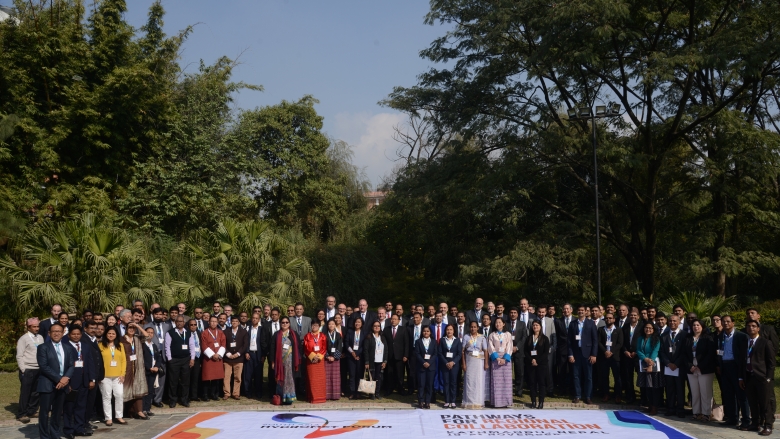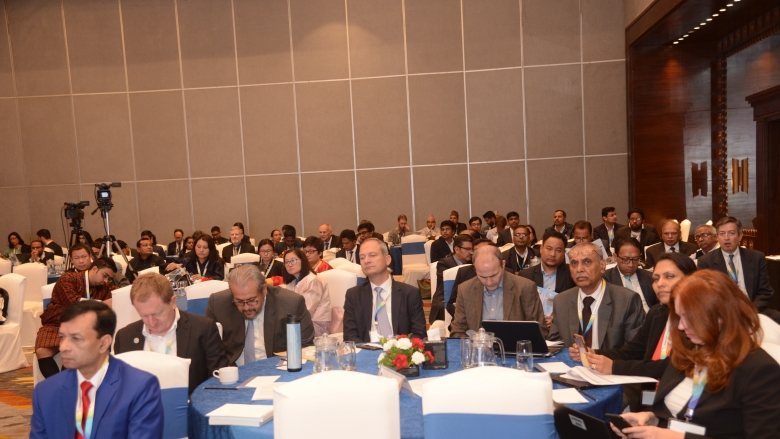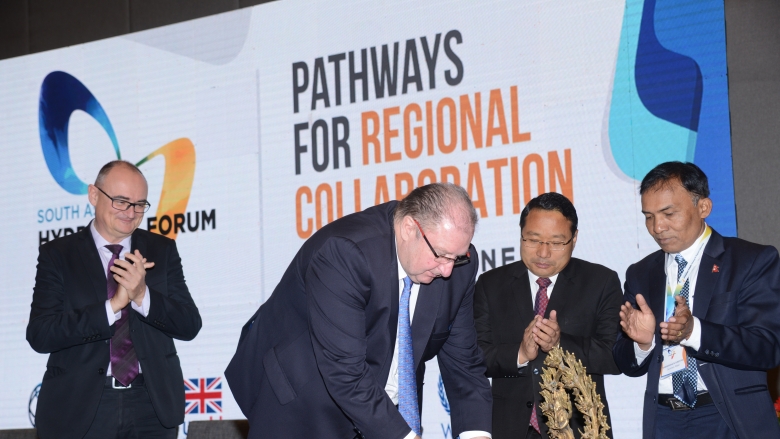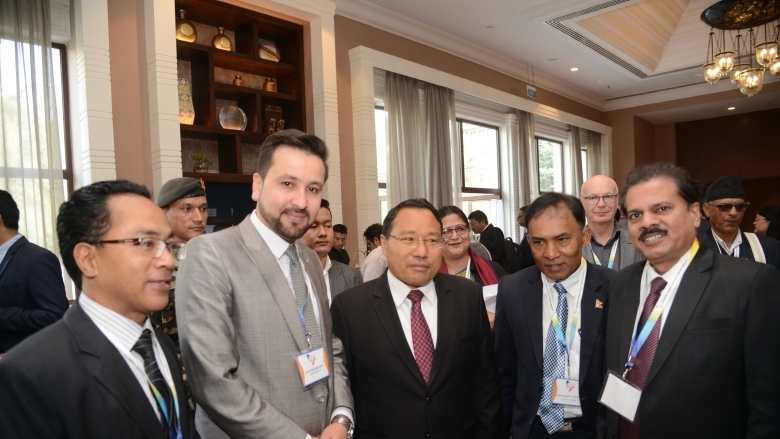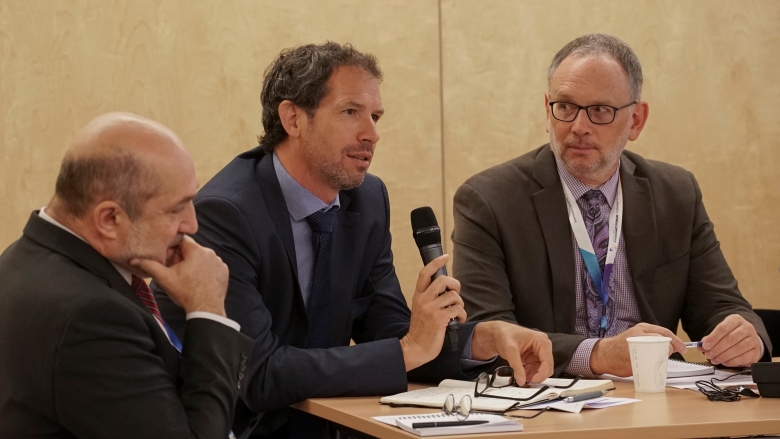November 19, 2019, Day 1 – Hyatt Kathmandu Regency Hall |
| Coffee and Registration 9.30 - 10.00 am: Corridor outside Regency Hall |
Opening Ceremony 10.00 – 11.00 am |
- Welcome Address – Er. Rabindra Nath Shrestha, Secretary of Ministry of Energy, Water Resources and Irrigation
- Lighting of the Panas by Mr. Barshaman Pun “Ananta”, Hon’ble Minister of Energy, Water Resources and Irrigation, and Mr. Hart Schafer, Vice President, South Asia Region, World Bank
- Opening Remarks – Mr. Hart Schafer, Vice President, South Asia Region, World Bank
- Statement from Secretary General of the World Meteorological Organization, delivered by Mr. Markus Repnik, Director, WMO
- Opening Statement – Mr. Barshaman Pun “Ananta,” Hon’ble Minister, Government of Nepal
|
| Group Photo 11.00 - 11.15 am: Garden outside Regency Hall |
| Coffee Break 11.15 - 11.30 am: Corridor outside Regency Hall |
Session 1: 11.30 am – 12.30 pm Chair: John Roome, Regional Director, South Asia, WB | Pathways for Regional Engagement This session will include a discussion of ongoing efforts in the modernization of weather and climate systems and services in the region. Following the outcome statement from SAHF I, a particular focus will be on operationalizing regional priorities supported by the development of a regional capacity and information initiative. |
| Presentations (15 mins) |
- SAHF and the Regional Hydromet Capacity and Information Initiative
|
Panel Discussion (45 mins) - Markus Repnik, Director, WMO
- Dr. A.R. Subbiah, Director, RIMES, Program Unit
- Dr. David Rogers, International Advisor, SAHF (Former Chief Executive of UKMet Office)
- Dr. Laxman Singh Rathore, International Advisor, SAHF (Former Director General of Indian Meteorological Dept, IMD)
- Arati Belle, World Bank
| - Visioning for hydromet services in South Asia
|
| Lunch 12.30 – 1.30 pm: Garden Area outside Regency Hall |
Session 2: 1.30 – 2.30 pm Chair: Christoph Pusch, Practice Manager, WB | Highlighting Lessons from Ongoing Programs in SAR This session will highlight some of the lessons from ongoing regional efforts and draw on assessments for hydromet capacity related needs. |
| Presentations (12 mins) | - Severe Weather Forecasting Demonstration Project (SWFDP)
- Highlights of Needs Assessment
- Hydromet Modernizaton: Lessons from Myanmar
|
| Coffee/Tea Break 2.30 – 2.45pm: Corridor outside Regency Hall |
Session 3: 2.45 – 4.15 pm Moderators: Dr. Laxman Singh Rathore; Dr. David Rogers, International Advisors for SAHF | Moderated Discussion on Prioritizing Regional Collaboration This session will include a panel discussion among the representatives from agencies providing weather, water and climate services. This session is focused on hearing voices from the different countries, with a view to elicit discussion on information sharing, mechanisms for collaboration and specific country needs. |
Panel Discussion (90 mins) - Mr. Sayed Reza Mousawi, Director, Meteorological Department, Afghanistan
- Mr. Shamsuddin Ahmed, Director, Meteorological Department, Bangladesh
- Mr. Karma Dupchu, Director, National Center for Hydrology and Meteorology, Bhutan
- Dr. Mrutyunjay Mohapatra, Director General, IMD
- Mr. Abdul Muhsin Ramiz, Director, Meteorological Services, Maldives
- Mr. Saraju Kumar Baidya, Director, Department of Hydrology and Meteorology, Nepal
- Dr. Muhammad Hanif, Chief Meteorologist and Project Director, Meteorological Department, Pakistan
- Ms. Dulari Gangani Fernando, Deputy Director, Department of Meteorology, Sri Lanka
| Collaboration on extreme weather: - Information sharing needs and mechanisms
- Products and information that can be shared
- Operational aspects during severe weather
- Training needs (regional, sub-regional)
|
| Reception and Dinner 6.30 pm: Corridor and Garden outside Regency Hall |
November 20, 2019, Day 2 – Hyatt Kathmandu Regency Hall |
Session 4: 9.00 – 10.45 am Chairs: Dr. Mrityunjay Mohapatra, Director General, India Meteorological Department, IMD; Mr. Shamsuddin Ahmed, Director, Bangladesh Meteorological Department, BMD | Advances and Solutions for Service Delivery – using data, technologies and remote sensing for forecasting This session will highlight innovative approaches to forecasting and decision support. |
| Presentations | - Advancing Global NWP through collaboration
- Innovations and lessons on Hydromet –IWMI experience
- Global streamflow forecasting
- Flood Forecasting using remote sensing
|
| Coffee/Tea Break 10.45 – 11.00 am: Corridor outside Regency Hall |
Session 5: 11.00 am – 12.30 pm Chairs: Mr. Imran Jamil Shami, Joint Secretary, Pakistan Aviation Division; Mr. Karma Dupchu, Director, National Center for Hydrology and Meteorology, Bhutan | Reaching Users – Linking Communities and Sectors with Specialized Services This session will discuss the good practices and innovative initiatives in the delivery of hydromet and climate services in various sectors with a focus on reaching communities and users including early warning, agriculture and transport. |
| - TN SMART: Multi-Hazard Decision Support System for preparedness, response, recovery and mitigation measures
- Delivering advisories and early warning to farmers in Bangladesh for resilience
- Weather and Water induced Landslides: Case studies
|
| Networking Activity 12.30-1.00pm: Regency Hall |
| Lunch 1.00 – 2.00 pm: Garden Area outside Regency Hall |
Session 6: 2.00 – 3.00 pm Moderators: Arati Belle, WB; Abdoulaye Harou, WMO | Bringing it together for Regional Collaboration – SAR on action planning This session will follow the discussion from Session 3 toward an agreed upon action plan that identifies pathways and priorities for regional collaboration |
- Senior Representatives of Meteorological, Hydrological and User Sector Agencies
- Dr. A.R. Subbiah, Director, RIMES Program Unit
| - Action planning for areas of regional collaboration and modalities to enhance communication among SAHF
- SAHF Regional Initiative Next Steps
|
| Coffee/Tea Break 3.00 – 3.15pm: Corridor outside Regency Hall |
Session 7: 3.15 – 4.15 pm Chair: Markus Repnik, Director WMO; Vladimir Tsirkunov, Lead Specialist, WB | Bringing it Together for Regional Collaboration – How can Development Partners Help? This session will allow for an exchange of views with development partners engaged with SAR countries on using SAHF to better align hydromet and climate services-related support. |
- Archana Shukla (DFID); David Corbelli (UKMO); Michael Ernst (USAID); Donna Lagdameo (Red Cross Red Crescent Climate Center); Ram Prasad Bhandari (JICA); Mandira Shrestha (ICIMOD); Moctar Aboubaca (WFP); and Joseph Intsiful (GCF)
| - Discussion to align and build on ongoing and planned Development Partners’ activities, particularly on training and capacity development
|
Session 8: 4.15 – 5.00 pm Chair: Er. Rabindra Nath Shrestha, Secretary of Ministry of Energy, Water Resources and Irrigation, Government of Nepal; Faris H. Hadad-Zervos, Country Manager, World Bank | Closing- Forum Voices (open mic)
- Closing Remarks, Director General of DHM, GoN
- Vote of Thanks, Arati Belle, World Bank
|
November 21, 2019, Day 3 – Nepal Hydromet Visits |
9.00 am | - Congregate for transport at the Hyatt Parking Lot outside the Main Entrance
- Travel to Sites
|
10:00 am – 10:45 am | - NARC Main Building: Presentation on Agro-Advisory Bulletins (AABs) and Agriculture Management Information
|
10:45 am – 11:15 am | - Q/A Session and Discussions (30 mins)
|
11:15 am | - Leave for DHM, Babarmahal, Kathmandu
|
12:00 pm – 1:00 pm | |
1:00 pm – 2:00 pm | - Presentation by DHM on Hydromet Modernization in Nepal (30 mins)
|
- Q/A Session and Discussions (30 mins)
|
| 2:00 pm – 3:00 pm | |
| 3:00 pm | |

